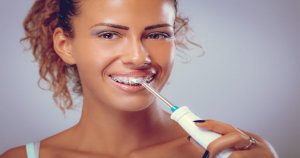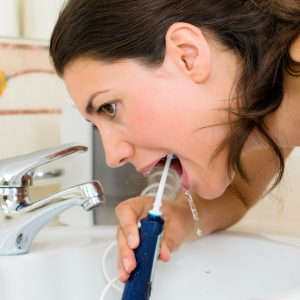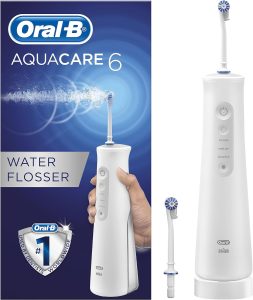Are you not a fan of flossing your teeth, and wondering what the best air flosser is? Perhaps you don’t like traditional floss or find it tricky to use. Or maybe you just don’t like the way it feels and find even water flossers are too much for your sensitive teeth.
Well, good oral hygiene is important to your overall health, so maintaining it is a must. This means flossing regularly. But, if you find that a struggle, then an alternative like an air flosser may be the solution.
This article will explain what an air flosser is, and answer the following questions so you can find the best air flosser for your needs:
- Are air flossers any good?
- How do you use an air flosser?
- Is an air flosser better than a water flosser?
- What is the best air flosser in the UK?
- What do air flosser reviews say?
You don’t have to rely on traditional floss to help maintain your oral hygiene, but it’s good to understand the pros and cons of each alternative.
The following table is a summary of the best air flossers in the UK, but you can read on for more detail:
Best Air Flossers | ||
Philips Sonicare AirFloss  |
| |
Oral-B Aquacare 6 Pro-Expert  |
| |
Philips Cordless Water Flosser  |
| |
In This Article
What is an air flosser?

Flossing is the action of cleaning between your teeth and around your gums where your toothbrush can’t reach. An electric air flosser is a device that helps you do this with air. More specifically by using a stream of air and droplets of water.
The stream of air and water disrupt the biofilm on your teeth and remove bacteria and food particles. This helps to prevent plaque and tartar build-up, as well as tooth decay and periodontal disease.
Now, you may be thinking that sounds just like a water flosser. We will get on to the differences between the two types of flossers later on. For now, you just need to know that the amount of water that an air flosser uses is minuscule in comparison to a water flosser.
Before we compare air and water flossers, let’s find out if they are any good compared to traditional floss.
Are air flossers any good compared to regular floss?
The first question we should ask is, are air flossers are any good? Because the answer is yes, they do disrupt the biofilm on your teeth and gums and help to remove bacteria and food particles from hard to reach areas.
However, this study found that when compared to regular floss and brushing, air flossers remove far less of the surface coating on the teeth. This is not really surprising, as regular old brushing and flossing are very efficient.
But, while regular floss may be more efficient, that does not mean people want to use it. In fact, some would rather not floss at all than have to use regular floss on their teeth. And those with fixed braces, or crowns may also struggle and need other options.
This is where air flossers and water flossers come into their own. They provide an alternative, and air flossers even more so than water flossers, for those with sensitive teeth.
They may remove less than regular floss, but for those that can’t or won’t use floss, they are good enough to remove plaque and bacteria. Combined with brushing your teeth, that should be enough to maintain your oral health.
So, when it comes to alternatives to regularly floss, what’s best? Air or water flosser?
How do air flossers compare with water flossers?

Water and air flossers are very similar, and they are both devices used to get between your teeth and clean where your brush can’t. They look pretty similar as well, except water flossers usually have a bigger handle or attached water tank.
This leads us to the main difference between the two flossers is that water flossers rely on a stream of pressurised water to clean between your teeth, and air flossers use a stream of air and small micro water drops.
Because of their different ways of flossing, they have slightly different looking heads. While most water flossers heads have a thin nozzle to shoot water, air flossers have a round head.
So, which one is better? If we look at this study comparing the Sonicare AirFloss to the Waterpik, the water flosser is more effective at both gingivitis and plaque removal.
But that doesn’t mean you should buy a water flosser instead of an air flosser. Air flossers have their advantages, let’s take a look.
Air flosser advantages and disadvantages
Although air flossers may not have been proven to be as effective as water flossers, they do have their advantages.
Advantages
- Less messy as they use less water
- Easy to use
- Don’t take up as much space as water flossers
- Good for sensitive teeth
- Cordless
- Good for those with fixed braces, or crowns
Disadvantages
- Doesn’t remove as much plaque or food particles as other flossing methods
- Less effective than a water flosser
- Expensive
How to use an air flosser
The air flossers that are on the market are cordless and hose-free and work by shooting bursts of air mixed with droplets of water along the gum line and between teeth. To use it, take the following steps.
- Add lukewarm water, or mouthwash to the water reservoir on the device
- Put the nozzle in your mouth and position it below the gum line and between the teeth
- Press the button to activate and it will give three bursts of air
- Move the nozzle along the gumline and repeat until you have finished cleaning your full mouth
- The whole process will take under 60 seconds to clean your mouth
The following video shows you how an air flosser works, and how it’s used.
What is the best air flosser in the UK?
To date, the only true air flosser on the market is the Philips air flosser, making them the best air flosser for teeth, as they are the only air flossers available. Their range of air flossers uses a stream of air with water droplets to floss between your teeth and gums.
However, Braun has a water flosser that uses Oxyjet technology. Their Aquacare Pro-Expert water flosser uses pressurised water, along with micro air bubbles to disrupt the biofilm on your teeth.
While it is not a true air flosser, we have included it as it still utilises air to work.

align=”aligncenter”]
Philips Sonicare AirFloss
The Philips AirFloss is a slightly more affordable option than the newer AirFloss Ultra. However, it has been discontinued by Philips and is currently only available from Amazon and Argos.
It looks very similar to the Ultra except the body is white and the nozzle is green. Philips claims this air flosser removes up to 99% of plaque when used in conjunction with brushing and mouthwash. This air dental flosser also has the following features:
- 30-second clean
- Cordless
- Manufacturer’s 2-year guarantee
Oral-B Aquacare 6 Pro-Expert
The Aquacare 6 Pro-Expert is actually more of a water flosser, but we have included it because of its Oxyjet technology. This water air flosser actually utilises micro air bubbles in its flossing action.

The Oral-B air flosser still relies on a stream of pressurised water to disrupt the biofilm on your teeth, but the cleaning action is boosted by these microbubbles. This water flosser also includes the following features:
- Removable water reservoir
- Two intensities: regular or sensitive
- Two streams: focused or rotational
- Six cleaning modes
- Cordless
If you are interested in seeing more water flossers, you can read our full guide here. Or keep reading to find out what air flosser reviews say.
Air flossers reviews
The following review is by a dentist. Dr Angela reviews the Philips Airfloss and gives her opinion on using air flossers. First, she walks us through how the device works, and all of the different parts including the water reservoir.
She also shows us a plaque disclosing tablet that she uses to show us all of the plaque in her mouth. The tablet when chewed turns all of the plaque in your mouth pink.
Dr Angela then brushes her teeth with her electric toothbrush, which removes most of the plaque but leaves areas between her teeth pink showing the remaining plaque. Then she uses the air flosser to remove the remaining pink areas.
Her overall review is that manual removal of plaque with traditional floss is still better However, the air flosser is good for people who don’t have great dexterity. So she recommends it as an addition to floss rather than a replacement.
The next review is by YouTube vlogger Agnes Mann who reviews the Philips AirFloss Ultra. She has been using the air flosser for 2 weeks and wants to give her honest opinion.
Right from the outset, Agnes is not pleased with the quality and feels that the device is not very durable. She’s also disappointed by the way it works. When you want to use it you need to press the button at the bottom for every single burst, which she feels is too much. It would be good if you just press the button once to start it.
Agnes rated the AirFloss Ultra 2 stars out of 5, which she still thinks is a good rating considering how disappointed she was with it.
Conclusion
Electric air tooth flossers are still a relatively new concept, and there are very few on the market. In fact, Philips are the only brand to have a range of air flossers available. Try their new AirFloss Ultra, or for a slightly more affordable price, their older model the AirFloss which has some of the same features.
Oral-B comes close by utilising Oxyjet technology and incorporating microbubbles into their stream of pressurised water. But their Aquacare Pro-Expert water flosser is still very much a water flosser.
It’s almost as close as the fight between Oral-B vs Sonicare electric toothbrushes!
Air flossers are dental devices that allow you to floss your teeth with air instead of the traditional string style of floss. If we compare air flossers to regular floss, they are not as efficient. But, they are better for people with less dexterity, or those with braces that need to clean around brackets and wires.
If we compare air flossers to water flossers, again they are not as efficient. However, they may be better for those with more sensitive teeth that don’t like to use water flossers. They are also less messy and more simple to use.
Overall, nothing beats traditional flossing, but if you need something slightly easier to use then air flossers may be the solution for you.
NCBI. Efficacy of Philips Sonicare AirFloss compared to manual brushing and flossing: an in vitro study. Consulted 17th November 2021.
NCBI. Comparison of two power interdental cleaning devices on plaque removal. Consulted 17th November 2021.




